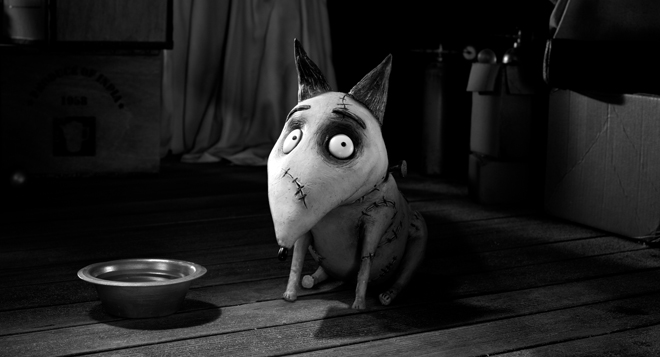Culture
A boy and his “Frankenweenie”

Frankenweenie
dir. Tim Burton
Release Date: Oct 05, 12
- 1
- 2
- 3
- 4
- 5
- 6
- 7
- 8
- 9
- 10
In 1984, before Tim Burton became a household name for accessible American macabre and longer before Tim Burton became a parody of himself designed to sell T-shirts at Hot Topic, he directed a short film titled Frankenweenie, about a young boy who loses his beloved dog and uses a few tricks from Mary Shelley’s playbook to bring him back to life. It’s become a beloved item for Burton fans, circulated more widely later on when attached to various home releases of The Nightmare Before Christmas. Now, nearly 30 years later, Burton has finally brought his pet project full-circle with Frankenweenie, a full-length, black-and-white, stop-motion animated version of the short. And unlike many recent Burton films (looking at you, Alice In Wonderland), Frankenweenie at times exudes the sort of darkly giddy joy that some of his best films (Beetlejuice, Edward Scissorhands, more recently Sweeney Todd) have mustered.
Young Victor (Charlie Tahan) spends most of his time in his house, making short horror films with the aid of action figures and his loyal dog, Sparky. Like so many Burton heroes, the real world has considerably less to offer Victor than his imaginary one. He mostly drifts through school, not necessarily bullied but definitely invisible to most. At the behest of his well-meaning parents (Catherine O’Hara and Martin Short), Victor tries out for the school baseball team, which ends up leading to Sparky’s untimely death by speeding car. Dejected, Victor takes his parents’ declaration that “If we could bring him back, we would” to extreme lengths, rigging a laboratory in the attic capable of attracting enough lightning to, say, revive a beloved family pet. Soon enough, word gets out about Victor’s breakthrough, causing his classmates to attempt their own pet resurrections. This doesn’t bode well for his town, New Holland, as it tries to prepare for the annual Dutch Day parade.
Frankenweenie is, if nothing else, an amalgamation of every Burton motif established throughout his career. From the cockeyed take on tranquil suburban life to the romance of the gothic, the film is covered in trademarks. At its best moments, such as a genuinely disturbing showdown between Sparky and a mutated neighborhood cat named Mr. Whiskers, Frankenweenie juxtaposes the magic of something as simple as a childhood pet with the very real sense of danger that childhood sometimes carries with it. Given how most recent filmmaking aimed at kids tends to treat them as though they’re unintelligent enough to devour hackwork (Hotel Transylvania), it’s refreshing to see a movie that acknowledges, empathizes with and understands the point in life at which the most seemingly innocuous personal tragedies can change you forever. Even as the stakes rapidly escalate as the film goes on, and Frankenweenie lands somewhere between Godzilla and James Whale’s Frankenstein, the focus always remains on the relationship between boy and dog, which may sound quaint but is oddly effective.
At the same time, cute and occasionally moving as it is, Frankenweenie falls short of reaching the genuine beauty of Burton’s best films, or even the recently released Paranorman, a film clearly influenced by Burton but which dug far deeper into the tragedies of being of grade school age. Though clearly a love letter to his own youth, Frankenweenie still occasionally shows traces of the through-the-motions work Burton has put out recently, with jokes like tea leaf omens found in cat feces and lots of the anarchic third-act chaos prominently featured in most modern family movies, albeit with a darker bent. There’s also the film’s central message about science’s potential to be used for good or bad, depending on the hands that wield it, which feels a bit too on-the-nose and is rarely brought up again once it’s acknowledged by Victor’s teacher (Martin Landau). Frankenweenie is clearly a film after Burton’s own heart, and sometimes that gets to shine through, but it’s a case of a passion project that may not mean as much to others as it surely does to its creator.